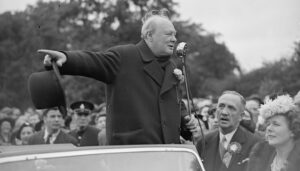Churchill’s Speeches: A Progression over time?
Introduction
Throughout the mid-20th century, Winston Churchill was widely renowned as one of the greatest speakers of his time. His speeches, delivered during some of the most tumultuous periods in modern history, continue to resonate for their eloquence, conviction, and ability to inspire. Over his long career as a respected and powerful leader, Churchill crafted countless memorable addresses, from rallying cries during World War II to impassioned appeals during election campaigns.

Winston Churchill meticulously wrote every word of his speeches, reportedly dedicating an hour of preparation for every single minute he would speak. His dedication to rhetoric and language was a highlight of his leadership style, as he understood the power of words to shape public opinion and galvanize nations.
Our goal with this project is to analyze how Churchill’s speeches evolved over time by examining stylistic and thematic changes in a selection of his most famous speeches. By identifying shifts in structure and word choice, we aim to gain deeper insights into how his rhetoric responded to the changing contexts of war, politics, and personal legacy.
We have gathered key speeches by Winston Churchill from the National Churchill Museum’s online archives, including The Sinews of Peace (commonly known as the “Iron Curtain” speech), his announcement of Germany’s surrender, the Victory in Europe speech, his address at the MIT Mid-Century Convocation, and his remarks to the Council of Europe. All speeches are publicly available and have been sourced directly from the museum’s digital collection.
Project Contributors:
Colin Madigan (Dickinson College ’25) – Literary analysis, website
Ben Trucksess (Dickinson College ’25) – Literary analysis, website
Luke Beiles (Dickinson College ’25) – Literary analysis, website
Latherine Vo (Dickinson College ’28) – Programming, data analysis
Tuan, Nguyen (Dickinson College ’28) – Programming, data analysis
Sources
https://www.nationalchurchillmuseum.org/the-council-of-europe.html